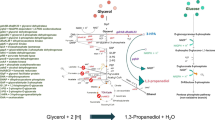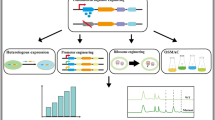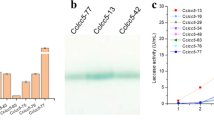Abstract
Hyaluronic acid (HA) is a multiple-function biopolymer that is widely used in food, cosmetic, and biomedical fields. In group C streptococci, the major workhorse of HA production in industry, the HA biosynthetic pathway has been proposed, while how HA synthesis is regulated is unclear. In this study, we identified twenty-five putative transcriptional repressors in S. zooepidemicus and studied whether they regulate HA synthesis or not. The individual gene deletion strain was firstly constructed, and the phenotypic changes of the corresponding deletion strains in stress tolerance and HA production were detected. The hrcA deletion strain is more sensitive to high temperature, and the rex deletion strain is more resistant to the oxidative stress. Three transcriptional repressor deletions resulted significantly decreased transcriptional levels of hasA, among which the scrR deletion strain shows most dramatical decrease in HA production. The regulatory mechanism of how ScrR affects the production of HA was further explored by transcriptional expression analysis of scrA and scrB, two direct target genes of ScrR regulon. Our results indicates that the deficiency of ScrR results in the unbalanced expression of scrA and scrB, which might also partly account for the decreasing production of HA. In agreement with the speculation, overexpression of scrB in ΔscrR genetic background results in 80% improvement in HA production. Taken together, the systemic genetic study of transcriptional repressors expands our understanding for the physiological regulation process of S. zooepidemicus and should help in the development of high-performance industrial strains for the efficient production of HA.
Key points
• Twenty-two transcriptional repressor genes in S. zooepidemicus were deleted individually, and the phenotypes of corresponding mutants on a variety of conditions were characterized.
• HrcA deficiency showed inferior cell tolerance to high temperature, and Rex deficiency showed superior cell tolerance to reactive oxygen stress, and four repressors deficiency showed inferior hyaluronic acid synthesis, among which the transcriptional levels of hasA of three mutants decreased significantly.
• Optimizing sucrose metabolic flux can enhance hyaluronic acid synthesis significantly.






Similar content being viewed by others
Data availability
The datasets generated during the current study are available from the corresponding author on reasonable request.
Code availability
Not applicable.
References
Anzai T, Timoney JF, Kuwamoto Y, Fujita Y, Wada R, Inoue T (1999) In vivo pathogenicity and resistance to phagocytosis of Streptococcus equi strains with different levels of capsule expression. Vet Microbiol 67:277–286. https://doi.org/10.1016/s0378-1135(99)00051-6
Bitoun JP, Nguyen AH, Fan YW, Burne RA, Wen ZT (2011) Transcriptional repressor Rex is involved in regulation of oxidative stress response and biofilm formation by Streptococcus mutans. FEMS Microbiol Lett 320(2):110–117. https://doi.org/10.1111/j.1574-6968
Blank LM, McLaughlin RL, Nielsen LK (2005) Stable production of hyaluronic acid in Streptococcus zooepidemicus chemostats operated at high dilution rate. Biotechnol Bioeng 90:685–693. https://doi.org/10.1002/bit.20466
Brown SW, Sonenshein AL (1996) Autogenous regulation of the Bacillus subtilis glnRA operon. J Bacteriol 178:2450–2454. https://doi.org/10.1128/jb.178.8.2450-2454.1996
Chen SJ, Chen JL, Huang WC, Chen HL (2009) Fermentation process development for hyaluronic acid production by Streptococcus zooepidemicus ATCC 39920. Kor J Chem Eng 26(2):428–432. https://doi.org/10.1007/s11814-009-0072-3
Chen YH, Wang Q (2009) Establishment of CTAB turbidimetric method to determine hyaluronic acid content in fermentation broth. Carbohyd Polym 78:178–181. https://doi.org/10.1016/j.carbpol.2009.04.037
Chen YY, Chen YY, Hung JL, Chen PM, Chia JS (2016) The GlnR regulon in Streptococcus mutans is differentially regulated by GlnR and PmrA. PLoS ONE 11(7):e0159599. https://doi.org/10.1371/journal.pone.0159599
Chong BF, Blank LM, McLaughlin R, Nielsen LK (2005) Microbial hyaluronic acid production. Appl Microbiol Biotechnol 66:341–351. https://doi.org/10.1007/s00253-004-1774-4
de Oliveira JD, Carvalho LS, Gomes AM, Queiroz LR, Magalhães BS, Parachin NS (2016) Genetic basis for hyper production of hyaluronic acid in natural and engineered microorganisms. Microb Cell Fact 15(1):119–137. https://doi.org/10.1186/s12934-016-0517-4
Fisher SH (1999) Regulation of nitrogen metabolism in Bacillus subtilis: vive la différence! Mol. Microbiol 32:223–232. https://doi.org/10.1046/j.1365-2958.1999.01333.x
Fulde M, Willenborg J, de Greeff A, Benga L, Smith HE, Valentin-Weigand P, Goethe R (2011) ArgR is an essential local transcriptional regulator of the arcABC operon in Streptococcus suis and is crucial for biological fitness in an acidic environment. Microbiology 157:572–582. https://doi.org/10.1099/mic.0.043067-0
Gering M, Brückner R (1996) Transcriptional regulation of the sucrase gene of Staphylococcus xylosus by the repressor ScrR. J Bacteriol 178(2):462–469. https://doi.org/10.1128/jb.178.2.462-469.1996
Kim JH, Yoo SJ, Oh DK, Kweon YG, Park DW, Lee CH, Gil GH (1996) Selection of a Streptococcus equi mutant and optimization of culture conditions for the production of high molecular weight hyaluronic acid. Enzyme Microb Technol 19:440–445. https://doi.org/10.1016/S0141-0229(96)00019-1
Liu L, Wang M, Du G, Chen J (2008) Enhanced hyaluronic acid production of Streptococcus zooepidemicus by an intermittent alkaline-stress strategy. Lett Appl Microbiol 46(3):383–388. https://doi.org/10.1111/j.1472-765X.2008.02325.x
Matsubara C, Kajiwara M, Akasaka H, Haze S (1991) Carbon-13 nuclear magnetic resonance studies on the biosynthesis of hyaluronic acid. Chem Pharm Bull 39:2446–2448. https://doi.org/10.1248/cpb.39.2446
Ogrodowski CS, Hokka CO, Santana MHA (2005) Production of hyaluronic acid by Streptococcus. Appl Biochem Biotechnol 122:753–761. https://doi.org/10.1385/ABAB:122:1-3:0753
Pagels M, Fuchs S, Pane-Farre J, Kohler C, Menschner L, Hecker M, McNamarra P, Bauer M, Wachenfeldt C, Liebeke M, Lalk M, Sander G, Eiff C, Proctor R, Engelmann S (2010) Redox sensing by a Rex-family repressor is involved in the regulation of anaerobic gene expression in Staphylococcus aureus. Mol Microbiol 76(5):1142–1161. https://doi.org/10.1111/j.1365-2958.2010.07105.x
Prasad SB, Jayaraman G, Ramachandran KB (2010) Hyaluronic acid production is enhanced by the additional co-expression of UDP-glucose pyrophosphorylase in Lactococcus lactis. Appl Microbiol Biotechnol 86(1):273–283. https://doi.org/10.1007/s00253-009-2293-0
Schulz A, Schumann M (1996) hrcA, the first gene of the Bacillus subtilis dnaK operon encodes a negative regulator of class I heat shock genes. J Bacteriol 178(4):1088–1093. https://doi.org/10.1128/jb.178.4.1088-1093
Sun X, Yang D, Wang Y, Geng H, He X, Liu H (2013) Development of a markerless gene deletion system for Streptococcus zooepidemicus: functional characterization of hyaluronan synthase gene. Appl Microbiol Biotechnol 97:8629–8636. https://doi.org/10.1007/s00253-013-5058-8
Vázquez JA, Montemayor MI, Fraguas J, Murado MA (2010) Hyaluronic acid production by Streptococcus zooepidemicus in marine by-products media from mussel processing waste waters and tuna peptone viscera. Microb Cell Fact 9:46–55. https://doi.org/10.1186/1475-2859-9-46
Wang Y, Hu L, Huang H, Wang H, Zhang T, Chen J, Du G, Kang Z (2020) Eliminating the capsule-like layer to promote glucose uptake for hyaluronan production by engineered Corynebacterium glutamicum. Nat Commun 11(1):3120–3129. https://doi.org/10.1038/s41467-020-16962-7
Wei ZG, Fu Q, Chen YS, Cong PQ, Xiao SQ, Mo DL, He ZY, Liu XH (2012) The capsule of Streptococcus equi ssp. zooepidemicus is a target for attenuation in vaccine development. Vaccine 30:4670–4675. https://doi.org/10.1016/j.vaccine.2012.04.092
Weigel PH (2002) Functional characteristics and catalytic mechanisms of the bacterial hyaluronan synthases. IUBMB Life 54(4):201–211. https://doi.org/10.1080/15216540214931
Widner B, Behr R, Von Dollen S, Tang M, Heu T, Sloma A, Sternberg D, Deangelis PL, Weigel PH, Brown S (2005) Hyaluronic acid production in Bacillus subtilis. Appl Environ Microbiol 71(7):3747–3752. https://doi.org/10.1128/AEM.71.7.3747-3752.2005
Wray LV, Ferson AE, Fisher SH (1997) Expression of the Bacillus subtilis ureABC operon is controlled by multiple regulatory factors including CodY, GlnR, TnrA, and Spo0H. J Bacteriol 179:5494–5501. https://doi.org/10.1128/jb.179.17.5494-5501.1997
Xie ZJ, Meng K, Yang X, Liu J, Yu J, Zheng C, Cao W, Liu H (2019) Identification of a quorum sensing system regulating capsule polysaccharide production and piofilm formation in Streptococcus zooepidemicus. Front Cell Infect Microbiol 9:121. https://doi.org/10.3389/fcimb.2019.00121
Zakeri A, Rasaee MJ, Pourzardosht N (2017) Enhanced hyluronic acid production in Streptococcus zooepidemicus by over expressing HasA and molecular weight control with Niscin and glucose. Biotechnol Rep (amst) 16:65–70. https://doi.org/10.1016/j.btre.2017.02.007
Zhang XZ, Wang M, Li TJ, Fu LX, Cao W, Liu H (2016) Construction of efficient Streptococcus zooepidemicus strains for hyaluoronic acid production based on identification of key genes involved in sucrose metabolism. AMB Expr 6:121. https://doi.org/10.1186/s13568-016-0296-7
Zheng TY, Lanahan AA, Lynd LR, Olson DG (2018) The redox-sensing protein Rex modulates ethanol production in Thermoanaerobacterium saccharolyticum. PLoS ONE 13(4):e0195143. https://doi.org/10.1371/journal.pone.0195143
Zhu HD, Wang Y, Ni YX, Zhou JM, Han LX, Yu ZY, Mao AH, Wang DD, Fan HJ, He KW (2018) The redox-sensing regulator Rex contributes to the virulence and oxidative stress response of Streptococcus suis Serotype 2. Front Cell Infect Microbiol 8:317. https://doi.org/10.3389/fcimb.2018.00317
Zotta T, Asterinou K, Rossano R, Ricciardi A, Varcamonti M, Parente E (2009) Effect of inactivation of stress response regulators on the growth and survival of Streptococcus thermophilus Sfi39. Int J Food Microbiol 129(3):211–220. https://doi.org/10.1016/j.ijfoodmicro.2008.11.024
Funding
This work was supported by the National Key Research and Development Program of China (2021YFC2100700), National Natural Science Foundation of China (32001033 and 21706192), Tianjin Science and Technology Committee (18YFZCSY01360 and 18JCQNJC78700), and the Tianjin Synthetic Biotechnology Innovation Capacity Improvement Project (TSBICIP-KJGG-006).
Author information
Authors and Affiliations
Contributions
WG designed all the experiments, analyzed the data, and wrote the manuscript. XZ, GZ, and MZ generated all the genetic constructs and conducted experiments. WC and ZX contributed with scientific discussions and commented on the manuscript. HL supervised the work and revised the manuscript. All authors read and approved the final manuscript.
Corresponding author
Ethics declarations
Ethics approval
This article does not contain any studies with human participants or animals.
Conflict of interest
The authors declare no competing interests.
Additional information
Publisher's note
Springer Nature remains neutral with regard to jurisdictional claims in published maps and institutional affiliations.
Supplementary Information
Below is the link to the electronic supplementary material.
Rights and permissions
About this article
Cite this article
Gao, W., Zhang, X., Zhang, G. et al. Is hyaluronic acid production transcriptionally regulated? A transcriptional repressor gene deletion study in Streptococcus zooepidemicus. Appl Microbiol Biotechnol 105, 8495–8504 (2021). https://doi.org/10.1007/s00253-021-11481-x
Received:
Revised:
Accepted:
Published:
Issue Date:
DOI: https://doi.org/10.1007/s00253-021-11481-x




